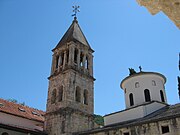| Church of the Dormition of the Mother of God | |
|---|---|
| Храм успења пресвете Богородице Crkva uspenja presvete Bogorodice | |
 | |
|
| |
| Location | Jova Jovanović Zmaj Street, Osijek |
| Country | Croatia |
| Denomination | Serbian Orthodox |
| History | |
| Dedication | Dormition of the Mother of God |
| Architecture | |
| Architect(s) | Dragomir Tadić |
| Style | Byzantine Revival ( Serbo-Byzantine Revival) |
| Administration | |
| Archdiocese | Eparchy of Osječko polje and Baranja |
The Church of the Dormition of the Mother of God ( Serbian Cyrillic: Храм успења пресвете Богородице, romanized: Hram uspenja presvete Bogorodice, Croatian: Crkva uspenja presvete Bogorodice) is a Serbian Orthodox church located in Donji grad, Osijek in eastern Croatia. The modern day church was completed in 1979 at the site of an earlier Serbian Orthodox church which was destroyed by the Ustashe regime in 1942 during the World War II Genocide of Serbs in the Independent State of Croatia. [1]
The new building was designed by Dragomir Tadić who was inspired by Serbo-Byzantine Revival style. [1] Due to this architectural style, the building is commonly known as Slavonian Lazarica after famous medieval Lazarica Church in Kruševac, Serbia. [1]
History
The wooden Eastern Orthodox church in Osijek was constructed at the time of the Great Migrations of the Serbs. [2] The new brick building dedicated to Paraskeva of the Balkans was erected at the same site in 1719. [2] The main church of Transfiguration of the Lord at the site of contemporary church was completed in 1743 as an grandiose building modeled after the Church of Saint Demetrius in Budapest (itself destroyed in 1940's). [3] As there was no goldsmith trained to build gilded dome of the church, some of the most prominent merchants in local Eastern Orthodox community collected 135 Gold ducat of Venice which were embedded into the dome to create the desired effect. [3]
In 2020 the parish initiated construction of the new cultural center. [4]
Gallery
-
Interior
-
External wall
See also
- Church of the Holy Prince Lazar, Birmingham
- Eparchy of Osječko polje and Baranja
- Osijek Co-cathedral
- Serbs of Croatia
- List of Serbian Orthodox churches in Croatia
References
- ^ a b c Srđan Sekulić (28 September 2018). "Saborni hram u Osijeku, manastirska crkva na daljskoj "Vodici" i hram u Šarengradu". Srbi.hr. Retrieved 1 April 2021.
- ^ a b "Otvorena je izložba povodom proslave 300 godina od podizanja prvog srpskog pravoslavnog hrama Uspenja Presvete Bogorodice u Osijeku". The City of Osijek. 9 July 2019. Retrieved 1 April 2021.
- ^ a b "Velika Gospojina u SPC u Osijeku". Croatian Radio. 28 July 2014. Retrieved 1 April 2021.
- ^ Vuk Tešija (10 February 2020). "Pogled uprt u budućnost - život srpske nacionalne manjine u Osijeku". Deutsche Welle. Retrieved 1 April 2021.
| Church of the Dormition of the Mother of God | |
|---|---|
| Храм успења пресвете Богородице Crkva uspenja presvete Bogorodice | |
 | |
|
| |
| Location | Jova Jovanović Zmaj Street, Osijek |
| Country | Croatia |
| Denomination | Serbian Orthodox |
| History | |
| Dedication | Dormition of the Mother of God |
| Architecture | |
| Architect(s) | Dragomir Tadić |
| Style | Byzantine Revival ( Serbo-Byzantine Revival) |
| Administration | |
| Archdiocese | Eparchy of Osječko polje and Baranja |
The Church of the Dormition of the Mother of God ( Serbian Cyrillic: Храм успења пресвете Богородице, romanized: Hram uspenja presvete Bogorodice, Croatian: Crkva uspenja presvete Bogorodice) is a Serbian Orthodox church located in Donji grad, Osijek in eastern Croatia. The modern day church was completed in 1979 at the site of an earlier Serbian Orthodox church which was destroyed by the Ustashe regime in 1942 during the World War II Genocide of Serbs in the Independent State of Croatia. [1]
The new building was designed by Dragomir Tadić who was inspired by Serbo-Byzantine Revival style. [1] Due to this architectural style, the building is commonly known as Slavonian Lazarica after famous medieval Lazarica Church in Kruševac, Serbia. [1]
History
The wooden Eastern Orthodox church in Osijek was constructed at the time of the Great Migrations of the Serbs. [2] The new brick building dedicated to Paraskeva of the Balkans was erected at the same site in 1719. [2] The main church of Transfiguration of the Lord at the site of contemporary church was completed in 1743 as an grandiose building modeled after the Church of Saint Demetrius in Budapest (itself destroyed in 1940's). [3] As there was no goldsmith trained to build gilded dome of the church, some of the most prominent merchants in local Eastern Orthodox community collected 135 Gold ducat of Venice which were embedded into the dome to create the desired effect. [3]
In 2020 the parish initiated construction of the new cultural center. [4]
Gallery
-
Interior
-
External wall
See also
- Church of the Holy Prince Lazar, Birmingham
- Eparchy of Osječko polje and Baranja
- Osijek Co-cathedral
- Serbs of Croatia
- List of Serbian Orthodox churches in Croatia
References
- ^ a b c Srđan Sekulić (28 September 2018). "Saborni hram u Osijeku, manastirska crkva na daljskoj "Vodici" i hram u Šarengradu". Srbi.hr. Retrieved 1 April 2021.
- ^ a b "Otvorena je izložba povodom proslave 300 godina od podizanja prvog srpskog pravoslavnog hrama Uspenja Presvete Bogorodice u Osijeku". The City of Osijek. 9 July 2019. Retrieved 1 April 2021.
- ^ a b "Velika Gospojina u SPC u Osijeku". Croatian Radio. 28 July 2014. Retrieved 1 April 2021.
- ^ Vuk Tešija (10 February 2020). "Pogled uprt u budućnost - život srpske nacionalne manjine u Osijeku". Deutsche Welle. Retrieved 1 April 2021.





